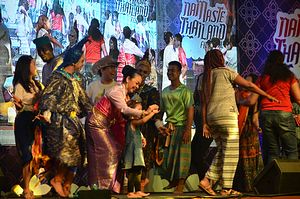The India-Thailand relationship has been shaped by centuries of deep-rooted historical and cultural connections. Located within close proximity of each other’s extended neighborhood, there have been extensive people-to-people contacts and a long history of a bilateral diplomatic relationship, which has now evolved into a comprehensive partnership.
Over half of the Thai language has roots in the Sanskrit and Pali languages, which originated in India. Buddhism, which flourished and spread under King Ashoka of the Maurya Dynasty, has now become the official religion of Thailand. Drawing inspiration from Indian arts and legends, the influence of Hinduism is also apparent in Thai religious practices, art, architecture, music, drama, and literature. The Hindu epic Ramayana has greatly influenced the Thai lore of Ramakien, from which the classical dances of Khon and Lakhon derived their inspiration. The Thai festivals of Songkran and Loy Krathong are enthused by the Indian festivals of Holi and Diwali.
In the recent past, India’s Act East policy has complemented Thailand’s Look West policy, which has greatly helped in bringing the two countries closer economically, politically, and culturally. Both countries are undergoing all inclusive reforms. India’s “Make in India” is pursuing sustainable and broad-based economic growth, while Thailand’s 4.0 economic model is transforming the economy into an innovation driven one, targeting the sufficiency economy philosophy to achieve sustainable development goals. To maintain security, prosperity, and stability in the region, and to link South and Southeast Asia, both countries cooperate in regional integration processes like the Bay of Bengal Initiative for Multi Sectoral Technical and Economic Cooperation (BIMSTEC), East Asia Summit, Asia Cooperation Dialogue, and Indian Ocean Rim Association.
The relationship was on display during the three-day long Namaste Thailand Festival, from March 9 to 11 in New Delhi. It provided an opportune moment to witness the culture of Thailand, in all its manifestation, in the capital city of India.
Arenla Jamir is an independent researcher based in New Delhi.















































